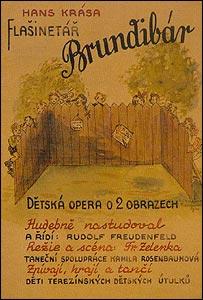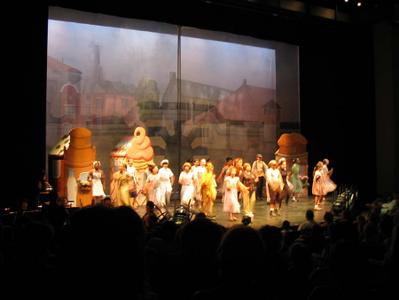 One of the great things that Washington National Opera does for our community is to host the Opera Camp for Kids every summer. Talented kids, from 10 to 14 years old, rehearse and mount a children's opera, with a small orchestra, sets, and costumes. This year, they presented Brundibár, an opera begun by Czech composer Hans Krása in Prague during World War II. He completed the opera in a new instrumentation, so that it could be performed by the children in the Terezín transit camp, where he was himself interned in 1942. Incredibly, the opera was performed over 50 times before Krása was taken to Auschwitz, the intended final destination of nearly everyone in the Theresienstadt ghetto. He was killed in the gas chambers in 1944.
One of the great things that Washington National Opera does for our community is to host the Opera Camp for Kids every summer. Talented kids, from 10 to 14 years old, rehearse and mount a children's opera, with a small orchestra, sets, and costumes. This year, they presented Brundibár, an opera begun by Czech composer Hans Krása in Prague during World War II. He completed the opera in a new instrumentation, so that it could be performed by the children in the Terezín transit camp, where he was himself interned in 1942. Incredibly, the opera was performed over 50 times before Krása was taken to Auschwitz, the intended final destination of nearly everyone in the Theresienstadt ghetto. He was killed in the gas chambers in 1944. Mini-Critic and I were there for the first performance yesterday, at the Round House Theater in Bethesda. If the background of the opera's history is horribly tragic, what Krása created is the sweetest, most innocent piece of musical theater you could imagine, a bittersweet operetta in the tradition of such works in Austria, Hungary, and the Czech Republic. This performance began with a reading of poems (in a narrative form created by Cindy C. Oxberry, with excerpts from the famous book of children's poems from Terezín, I Never Saw Another Butterfly), accompanied by slides shown on a screen hanging above the stage. The opera itself, a combination of spoken lines, choral scenes, and solo songs, probably takes about forty minutes or less to perform. However, as we heard in a preperformance lecture by Ela Weissberger (a Holocaust survivor, who as a child created the role of the Cat in Brundibár in the Terezín camp), the 55 performances that Krása led in the Theresienstadt ghetto meant the world to the children interned there. "Brundibár was our lives," she told us. "When we were rehearsing and performing, we forgot pain, sadness, hunger. That is how important music can be to people." (The moral importance of the opera is not compromised, in my opinion, by the fact that the Nazi propaganda machine used it as an example of the good treatment prisoners in its concentration camps received, even allowing the Red Cross to see one of the performances.) Ms. Weissberger has traveled around the world, trying to keep the opera alive and get it performed.
Mini-Critic and I were there for the first performance yesterday, at the Round House Theater in Bethesda. If the background of the opera's history is horribly tragic, what Krása created is the sweetest, most innocent piece of musical theater you could imagine, a bittersweet operetta in the tradition of such works in Austria, Hungary, and the Czech Republic. This performance began with a reading of poems (in a narrative form created by Cindy C. Oxberry, with excerpts from the famous book of children's poems from Terezín, I Never Saw Another Butterfly), accompanied by slides shown on a screen hanging above the stage. The opera itself, a combination of spoken lines, choral scenes, and solo songs, probably takes about forty minutes or less to perform. However, as we heard in a preperformance lecture by Ela Weissberger (a Holocaust survivor, who as a child created the role of the Cat in Brundibár in the Terezín camp), the 55 performances that Krása led in the Theresienstadt ghetto meant the world to the children interned there. "Brundibár was our lives," she told us. "When we were rehearsing and performing, we forgot pain, sadness, hunger. That is how important music can be to people." (The moral importance of the opera is not compromised, in my opinion, by the fact that the Nazi propaganda machine used it as an example of the good treatment prisoners in its concentration camps received, even allowing the Red Cross to see one of the performances.) Ms. Weissberger has traveled around the world, trying to keep the opera alive and get it performed.Darien Bates, Washington Children's Opera Camp Gives a Different Perspective to Tragedy of Holocaust (Falls Church News-Press, August 11) Amber Healy, Learning History through Opera: Great Falls girl participating in opera camp (McLean Connection, August 10) Emily Cary, Holocaust survivor aids 'Brundibar' (The Examiner, August 3) Paula Kennedy, Germans perform Holocaust opera (BBC News, January 27, 2005) Gary B. Cohen, Hans Krása's Brundibár, and the Surreal Cultural Life of Theresienstadt (Minnesota Public Radio, January 4, 2004) |
 Brundibár is, of course, a thinly disguised portrayal of Hitler. The English words (of which I have no way right now to determine the accuracy) include phrases like "Children will now win the war," "the dictator Brundibár will be defeated," and in the final chorus "We've won a victory / Over the tyranny." I don't know how much the children who performed the work in Terezín understood the symbolism, but it is a heartbreaking thing to contemplate. If only the problem had been as simple as a mean organ-grinder, and the solution to it as easy to perform as a lullaby.
Brundibár is, of course, a thinly disguised portrayal of Hitler. The English words (of which I have no way right now to determine the accuracy) include phrases like "Children will now win the war," "the dictator Brundibár will be defeated," and in the final chorus "We've won a victory / Over the tyranny." I don't know how much the children who performed the work in Terezín understood the symbolism, but it is a heartbreaking thing to contemplate. If only the problem had been as simple as a mean organ-grinder, and the solution to it as easy to perform as a lullaby.This was a beautiful production, with talented children in all of the roles. It was pleasing to the ears and the eyes, with Kevin Adams's attractive sets (the backdrops based on the architecture of the Terezín camp) and Rhonda Key's fanciful costumes. Mini-Critic's favorite parts of the set were the three rolling pieces that became the bakery shop, ice cream shop, and dairy on the main street, which he recounted to both me and Mrs. Ionarts several times, along with the exploits of the Sparrow, Cat, and Dog. The performances of Brundibár are free, with a reservation, by phone (202-448-3465) or e-mail (education@dc-opera.org). There are two more performances today (August 14 at 12 noon and 2 pm) at the Round House Theater, and one on Tuesday (August 16 at 6 pm) at the Kennedy Center Millennium Stage.
No comments:
Post a Comment